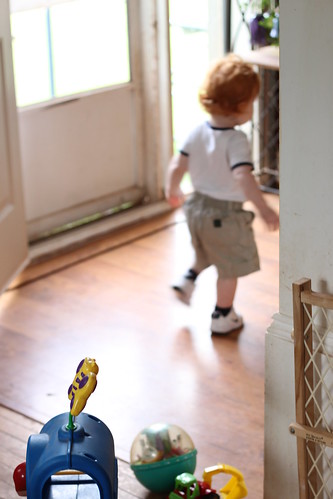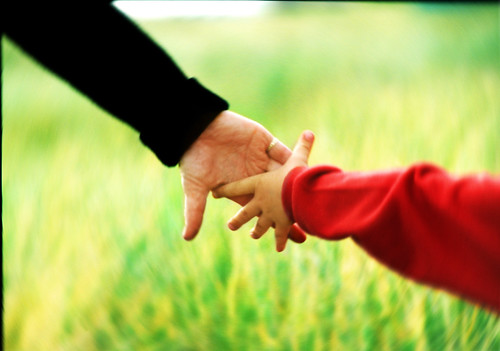”Empathy works so well because it does not require a solution. It requires only understanding.” – John Medina
Update: This is the second post in a series of ten on gentle, effective ways to discipline young children. This post focuses on the importance of showing and expressing empathy for your child’s feelings (warmth), while setting and maintaining firm limits, and inviting your child’s participation in the task at hand. Magda Gerber said, “In the beginning we co-operate more with the baby, and slowly, we ask for more and more participation from them.” There is no doubt that the way we approach a child, what we say, and the way we say it has a huge impact on how our requests are received, and how willing and able our children are to co-operate.
I am going to ask you to take a moment to try and see the world the way a toddler might see it. Get down on your hands and knees, and take a look around. What do you see, what do you hear, how do you feel?
Toddlers are so small, yet they often have very big ideas and plans, but very little say over what happens to them, and when. Think about what it must feel like to be happily engaged in an activity, and then suddenly have someone tell you to hurry up, or that it’s time to stop and move on to something else. This happens quite often to a toddler throughout the day.
Toddlers are very oriented in present time and tend to become totally engrossed in whatever it is they are doing at the moment. They don’t carry around the same agendas and timetables in their heads that we do. They are not ignoring us, trying to manipulate us, or trying to drive us crazy when we call out from across the room that it is time to get dressed to go, and the only response we get is silence. They literally may not register what we are saying.
How to avoid frustration for both child and adult? Slow down, come close, get down to the child’s level, make eye contact, and take a minute to acknowledge what the child is doing. You might say, “I see you are busy building with your blocks, but in a few minutes it will be time to stop playing, put your blocks away, and get dressed.”
In another few minutes, go to her again, get down to her level, make sure you have her attention, and tell her, “It’s time to put your blocks away and get dressed now. I’ll get the bucket for the blocks. Will you help me by getting that one over there and putting it in the bucket?”
There isn’t a need to continue to repeat yourself or to become upset, because most children will co-operate readily if they are always treated in this respectful way. Again: take the time to connect with her and make sure you have her attention, acknowledge what she is doing, let her know what to expect, give her time to transition, request her participation, and involve her meaningfully in the next activity or task at hand.
These few paragraphs illustrate several of the basic tenets of respectful caregiving or parenting, and you can begin to practice communicating in this way with an infant who is just days old.
What if your child doesn’t co-operate, even if you are consistently following the above steps? What if she cries, runs away, or refuses to participate ? It happens sometimes!
First acknowledge her feelings-” I hear you crying, and saying “No!” It’s hard to stop playing when you’re having such a good time. You don’t want to put the blocks away and get dressed.” Full stop. Just let your words sink in, and listen while your child expresses her feelings. (Remember, listening and expressing empathy for a child’s point of view DOES NOT mean that you agree, or that you must give in- it just means allowing her to have and express her feelings, and letting her know you understand.)
In a few minutes, repeat your request. “I understand you don’t want to, but it is time to get dressed now. I will help you. What do we need to do first?” Continue to talk her through the process and ask for her participation. You can offer choices where appropriate-“Would you like to walk to your room, or do you want me to carry you?” No time outs, bribes, false praise, or comments on what a good or bad child she is.
If she participates in the process try saying thank you. If she doesn’t participate, acknowledge and move on. You might say something like, “This is hard for both of us right now. You don’t want to stop playing, but it is time. I will help you, and I’d like you to help me.” The more focused and calm you remain, the more likely it is your child will choose to co-operate.
If she can’t make a choice, you make one for her.
There may be times when it is helpful to back off and give a child a little space. The little boy I am caring for (now 32 months) has recently been going through a period where it has been extremely important for him to feel like he has a lot of choice in what will happen and when, even though he has a predictable daily routine, and long uninterrupted play times everyday. J. routinely and without fail balks at any transition (change from one activity to another) even if it is something like putting his shoes on to go outside, when he has asked to go out in the first place! His parents and I find that it works best for J. if we disengage from the struggle, and give him a few minutes to decide to come around on his own.
Here’s an example: We’re out in the back yard playing. It’s time to go inside and wash hands for dinner. J. knows this because we’ve given him a warning, but when we say it’s time to stop playing and close up the sandbox, he yells, “No, I don’t want to.” Instead of repeating the request, issuing an ultimatum, begging, cajoling, or entering into a contest of wills, which we know from experience will lead to a screaming tantrum, we tell J. that we are going to go inside, and wash our hands, and eat dinner together, and he may join us when he is ready. (Our yard is fenced in and safe, and we can see and hear J. from the kitchen windows.) Within minutes J. will call to us saying, “I ready now. I coming!” And he does. And there is much more peace at our home than there would otherwise be.
A special note about toddlers and running away: this is a favorite toddler game- it’s just plain fun for them, plus on an emotional level they want and need to know that you will come after them and find them! It is very reassuring to a newly mobile and independent child who is exploring more and more of her world outside of the safety of your arms and sight to know that you are paying attention!
So take the time to play hide and seek and chasing games any time your toddler initiates, and re-read The Run Away Bunny (by Margaret Wise Brown) with him, but be clear that you don’t want your toddler to run away when it’s time to do something together like get dressed, or walk from the car to play class.
Tomorrow: how creating consistent daily routines can help toddlers to co-operate more easily.

